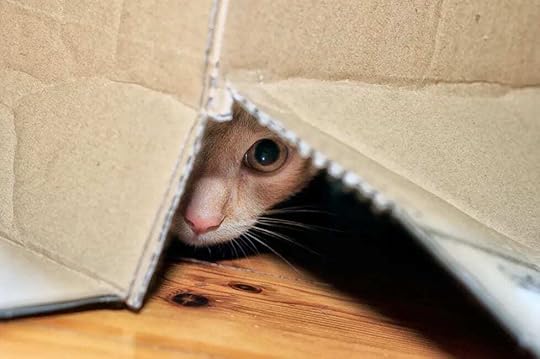The Terror Of Being Seen

Ever so often, someone will thank me for being so open or honest about my work, my feelings, my observations.
And I freeze in abject terror.
It’s always said with gratitude and even a little vulnerability (giving compliments is never easy). The person thanking me is doing so for a reason, and because they wish more people would be vulnerable and ‘real’ about their journey. Perhaps it’s something I wrote about sustainability, or autism, or storytelling They resonated with whatever I said because I shared my truth, even if that sometimes puts me in an unflattering light (as truths are wont to do).
That openness allowed them to connect, to feel relief at not being alone, to feel seen themselves. Sounds pretty good, eh? Clearly, I should bask in the warm glow of the connection and impact I’ve made.
But in that moment, I usually want to hide under the table. Sometimes, if more than one person tells me the same thing at a single event, I DO go and hide in the loos until I gather myself.
Why?
Because being seen, truly seen, is bloody terrifying.
I only manage to do it because even if I’m standing in front of an audience, or sharing with thousands of followers, I convince myself no one is listening.
We’re told that vulnerability is brave, that authenticity is magnetic, that our raw truths are what the world needs. And that’s all… correct. But it can be almost unbearable.
Why We Fear Being SeenPsychologists call it the ‘exposure effect’, but not the kind that makes people like something more the more they encounter it. I mean the visceral sense of exposure that comes with saying something that matters, posting something personal, or publishing something that came from deep inside your soul.
It’s the moment after clicking ‘publish’ or saying something more open than intended on stage - when your heart manages to go quantum by dropping into your stomach and soaring into the air at the same time. You feel it when a friend says ‘I loved what you wrote about…’ and you immediately want to deflect or diminish. You feel it when the thing that’s most you is out there, and suddenly you wish you’d worn armour instead.
Neuroscientist Brené Brown has called this a ‘vulnerability hangover.’ That raw, post-reveal shame spiral that screams: Why did I do that? What if they misunderstand me? What if they don’t like me? What if they do?
In our age of curated perfection and algorithmic outrage, being honest feels dangerous. Not just because of trolls or judgment (though they’re real, I have a few), but because it asks us to sit with the truth that we are uncertain, unfinished, and a little messy.
It’s Almost Impossible……and yet.
I’ve come to believe that this terror of being seen is the gateway to genuine connection, and in our climate of confusion, it may be the only compass worth following.
The people who have helped me most in life were not the ones who had the slick answers or polished personas. They were the ones who said ‘I don’t know either,’ or ‘Yep, I suck at that too’.
Especially in sustainability, literally NO ONE has the definitive answer. We are all seeking spots of light in the growing darkness.
I write posts like Fighting Monsters When You’re Tired not because I want to be inspirational, but because I was bloody exhausted, and didn’t want to pretend otherwise. And the responses I received made it clear: we are all walking through fire in our own way, and honesty doesn’t add to the flames. It lights a path.
Fiction Is Worse (So Better)It amuses me now that I thought fiction would be easier, because I’m making it up. When I started writing Godstorm, my upcoming novel, I thought I was building a mythic world about petrol-worship, doomed empires, and climate change.
But the real storm was inside the characters.
One of my protagonists, a governess forced to protect a child in a collapsing regime, spends much of the story hiding how she really feels. She believes her strength lies in secrecy and strength. But the turning point comes not when she defeats her enemies, but when she lets someone see her.
It’s that act of being seen, truly seen, that saves her.
Because fiction lets us live vicariously through vulnerability. It lets us love people we’d never meet and feel things we’d never admit.
The Gift Of GlareThere is power in telling your story before it's wrapped up with a bow. Before you’ve succeeded or survived. While you’re still in the middle, confused and healing.
That kind of truth gives others permission. Even if that’s the permission to say thank you (because of course, deep down, those people who thank me are the ones who actually keep me going!)
And if there's one lesson I hope Godstorm carries, and one I try to live in these essays, it's this:
The world doesn’t need our perfection. It needs our perseverance.
Especially now, when everything around us urges cynicism and silence.
Just A Little More BraveryYes, I will probably still internally flinch the next time someone thanks me for being honest. But I will also smile, and maybe even hug. Because maybe my panic attack helped someone else breathe a little easier.
So if you are wondering whether to say the thing, write the thing, share the thing that truly matters to you, know this:
You might want to hide. But someone else out there is holding their breath, waiting for someone (anyone) to go first.
Let them see you.
Because that’s how the good stories start.
…………………………………………….
Want to read Godstorm, six months before anyone else?I’m recruiting a ‘launch team’ of volunteers to help promote my debut novel Godstorm. Join us, and you’ll get a free e-book copy of the novel to review (before anyone else), as well as all the gossip and goodies. To sign up, click here (UK only)



